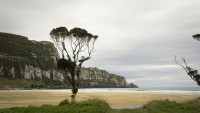Otago Polytechnic continues to demonstrate its commitment to making a better world, becoming the first tertiary institution in New Zealand to join the Climate Leaders Coalition.
From Z to Air New Zealand, the coalition comprises 60 businesses that have pledged to reduce emissions and play a leadership role in New Zealand’s transition to a low emissions economy in an effort to meet our national commitments under the Paris Agreement.
At Otago Polytechnic, we measure our greenhouse gas emissions and publicly report on them. We set a public emissions reduction target consistent with keeping within 2° of warming and have committed to being carbon neutral by 2030.
To “lead the way in sustainable practice” is a strategic goal at the highest level at Otago Polytechnic.
That goal includes several specific targets for 2021 that relate to carbon emissions, including 80% waste reduction, 30% energy reduction in existing buildings, and planting 3000 trees.
“We are in the process of a significant campus redevelopment. We are moving from older less efficient buildings to modern buildings with sustainability and carbon management at the core of their design,” says Philip Cullen, Chief Operating Officer, Otago Polytechnic.
This focus also reduces “whole-of-life” building operating costs and contributes significantly to the following key sustainability criteria:
- Low embodied carbon footprint
- “Living Building Challenge” (LBC) material (Red List) compliance
- LBC material local economy sourcing compliance
- LBC material net positive waste compliance
- Biophilic environments
Our impact on carbon emissions from our operations is only a small part of our contribution to staying within the 2° target. Otago Polytechnic has committed to 100% of our undergraduate programmes directly addressing issues of sustainable practice. This means all our graduates will be capable of having an impact on sustainability throughout their careers.
Through innovation and strategic investment, we have achieved a significant reduction on carbon since we started reporting in 2011, from 2880 tCo2e in 2011 to 2069 tCo2e in 2017, even with a significant growth in business.
The exception is a small increase in the last year. Our analysis indicates that was largely due to more robust reporting processes for air travel. As evidenced in the annual report from the Tertiary Education Facilities Management Association, we have the lowest emissions on a per-student basis of all of the 12 tertiary education institutions in the process.
In the next 12 months Otago Polytechnic is undertaking an analysis of what international benchmark systems we should align with. These will evaluate the options in the broader context of sustainable practice as well as driving our ambition to be carbon neutral by 2030.
Published on 20 Aug 2018
Orderdate: 20 Aug 2018
Expiry: 31 Oct 2018






